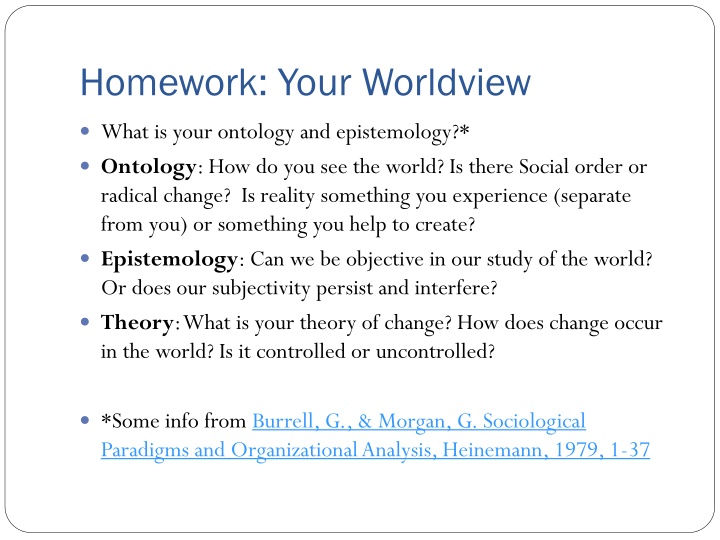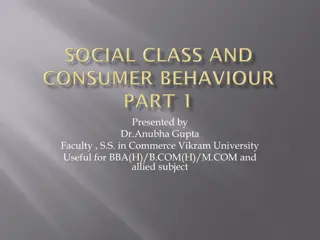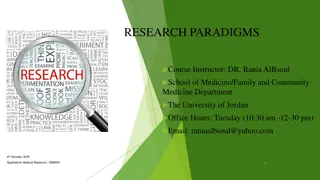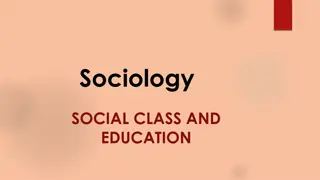
Ontology and Epistemology in Sociological Paradigms
Explore the concepts of ontology and epistemology in sociology, reflecting on how individuals perceive the world and approach knowledge acquisition. Delve into different perspectives such as social order, radical change, objectivity, and subjectivity to understand theories of change and their implications on worldview.
Uploaded on | 0 Views
Download Presentation

Please find below an Image/Link to download the presentation.
The content on the website is provided AS IS for your information and personal use only. It may not be sold, licensed, or shared on other websites without obtaining consent from the author. If you encounter any issues during the download, it is possible that the publisher has removed the file from their server.
You are allowed to download the files provided on this website for personal or commercial use, subject to the condition that they are used lawfully. All files are the property of their respective owners.
The content on the website is provided AS IS for your information and personal use only. It may not be sold, licensed, or shared on other websites without obtaining consent from the author.
E N D
Presentation Transcript
Homework: Your Worldview What is your ontology and epistemology?* Ontology: How do you see the world? Is there Social order or radical change? Is reality something you experience (separate from you) or something you help to create? Epistemology: Can we be objective in our study of the world? Or does our subjectivity persist and interfere? Theory: What is your theory of change? How does change occur in the world? Is it controlled or uncontrolled? *Some info from Burrell, G., & Morgan, G. Sociological Paradigms and Organizational Analysis, Heinemann, 1979, 1-37
Homework Revisited Ontology: Social Order vs. Radical/constant change Epistemology: Objective vs. Subjective Functionalism: Social Order + Objectivity Interpretivism: Social Order + Subjectivity Radical Structuralism: Constant change + Objectivity Radical Humanism: Constant change + Subjectivity
The Research Process & Types of Research Fall 2015 Research Methods Class 3
The Research Process Observation (exploration+question) 2. Rationalization (design+method) 3. Validation (data + analysis) 1. 1 2 3
http://web.media.mit.edu/~stefan/hc/projects/tuna/tuna.graphic.jpghttp://web.media.mit.edu/~stefan/hc/projects/tuna/tuna.graphic.jpg Observation: Exploration Experience Curiousity, life experiences, interests, choosing a topic Literature Review Find articles about topics of interest focus on specific aspect What has already been written on my topic? Research Question Begin to formulate a research question What do I want to know?
Rationalization: Research Design Define concepts/variables: operationalization What concepts are part of my topic? How do I define these concepts so they can be measured? Research Question Refine question with operational definitions Choose a method + sample How do you collect data? Who are you asking? Methods: Surveys, interviews, focus groups, ethnography, case study, participatory action research, secondary data analysis, (experiments) Research Proposal* Now you know what you want to do, write it up, get approved ($)
Validation: Data & Analysis Collect data Quantitative or Qualitative? Mixed Methods? Data Analysis Depends on types of data collected Research Report* Conclusion and findings
The Research Process Observation (exploration+question) 2. Rationalization (design+method) 3. Validation (data + analysis) 1. Research Type 1 2 3
Types of Research Descriptive Making careful observations and detailed documentation of a phenomenon What, Where, When What amount of formerly incarcerated individuals have trouble finding a job? Exploratory Conducted in new areas of inquiry to scope out the magnitude or extent of a particular problem or to generate some initial ideas Do formerly incarcerated individuals face barriers to employment? Explanatory Most academic research is explanatory tries to connect the dots Why do formerly incarcerated individuals have trouble finding a job? How are formerly incarcerated individuals treated by employers? Evaluative Does Program X helped formerly incarcerated individuals find and keep a job?
Discuss Criminal justice system:Sentencing, plea bargaining Prison:Reform,Recidivism,Mass incarceration, overcrowding Economic inequality NYPD/Law Enforcement:Hiring process,Racial bias Drugs:Abuse,Legalization, Decriminalization Immigration/Human trafficking Gentrification Social/Political Movements 1. 2. 3. 4. 5. 6. 7. 8.
Criminal justice system 1. Prison Economic inequality NYPD/Law Enforcement 1. 2. 3.
Drugs Immigration/Human trafficking Gentrification Social/Political Movements 1. 2. 3. 4.
Reading Chapter 2: Thinking Like a Researcher (p. 9-15) In Social Science Research- Principles Methods and Practices Sections 2.1-2.2: Basic Concepts & Generating Good Research Questions (p. 23-38) In Research Methods in Psychology Pay attention to: Unit of Analysis Concept Variable Independent vs. dependent variable Operational definition Correlation vs. Causation
Dialectics of Social Research There are many ways and methods to conduct social research Idiographic and Nomothetic Explanation How do we explain a situation, group of people? Inductive and Deductive Theory What is your reasoning method? Quantitative and Qualitative Data What type of data are you collecting? Pure and Applied Research What is the type and purpose of the research you are conducting?






















